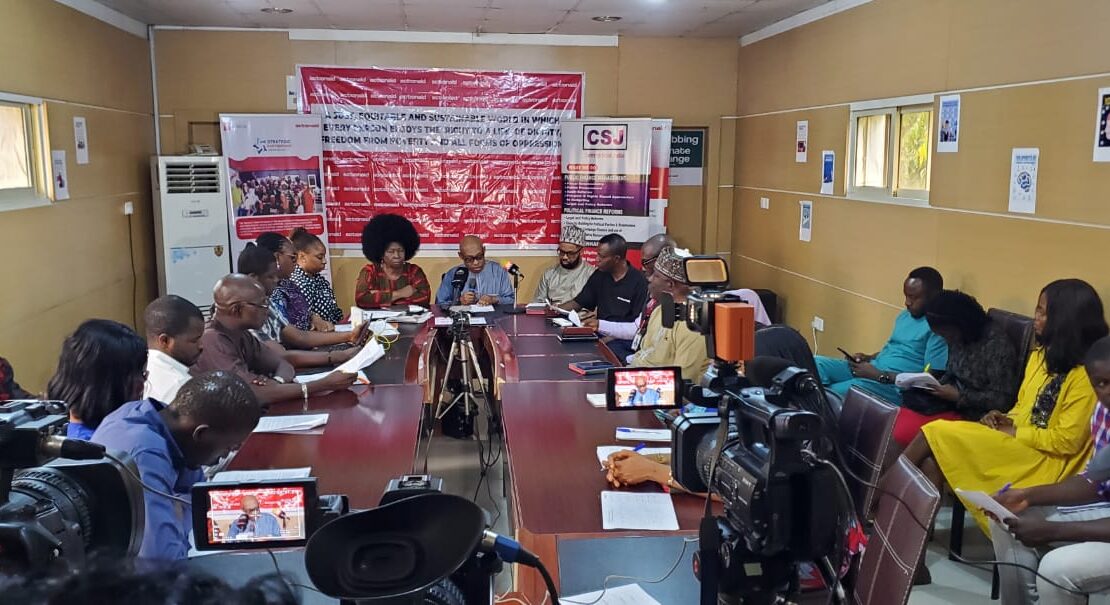CSJ and ActionAid Nigeria Raise Issues About Proposed N500 Billion Palliative Distribution by FG
CSJ and ActionAid Nigeria Raise Issues About Proposed N500 Billion Palliative Distribution by FG
-
August 16, 2023
- Posted by: Center for Social Justice

The Centre for Social Justice (CSJ) and ActionAid Nigeria have come together to voice their profound concerns over the Federal Government’s recent announcement of a N500 billion-naira palliative distribution. The plan aims to provide N8,000 to 12 million impoverished households in Nigeria over a six-month period. While acknowledging the government’s intent to alleviate poverty and offer temporary relief, both organizations have highlighted reservations about the plan’s long-term viability and inclusiveness.
The collaboration between CSJ and ActionAid Nigeria underscores their shared dedication to fostering social justice, facilitating transformative change, and eradicating poverty within Nigeria. This joint initiative emanates from a mutual belief in the significance of well-structured and comprehensive interventions that uplift the most marginalized communities and establish enduring, positive impacts.
Significant concerns have been raised by both organizations about the proposed palliative plan. A significant point of contention is the uncertain manner in which the funds will be digitally disbursed to the intended households. A considerable portion of Nigeria’s extremely impoverished population lacks access to bank accounts, mobile wallets, or convenient banking services. While the proposed N8,000 per month disbursement for six months could offer momentary respite, it fails to adequately address the lingering effects of inflation on the vulnerable populace. The critical question remains: how will the Federal Government reach those who lack the essential means to receive digital transfers? The exclusion of these disadvantaged individuals casts doubt on the effectiveness and credibility of the proposed cash transfer initiative.
Transparency and fairness surrounding the selection criteria for the 12 million beneficiaries of this cash transfer initiative also raise significant concerns. In the absence of a clear and inclusive selection process, the risk of uneven allocation looms large. This risks leaving out deserving individuals or regions, while potentially diverting funds to those who may not be in dire need, thus undermining the core objective of poverty alleviation.
Amidst the implementation of this cash transfer program, it becomes crucial for the Federal Government to grasp the broader socio-economic landscape. The recent removal of fuel subsidies, as announced by the President, has led to soaring inflation rates nationwide. While the proposed monthly N8,000 disbursement might offer short-term relief, its capacity to mitigate the impact of inflation on the impoverished is limited. Long-term considerations and sustainable strategies are imperative to address the underlying factors contributing to poverty.
In light of these concerns, ActionAid Nigeria and Centre for Social Justice jointly implore the Federal Government to adopt a more robust and sustainable approach that emphasizes financial inclusivity and effectively targets the most vulnerable communities. This involves exploring alternative avenues for digital transfers that can bridge the gap for the unbanked population, utilizing technology to ensure transparency and accountability throughout the selection process. Vigilance is paramount, given the potential for corruption and mismanagement to reemerge, potentially compromising the distribution process.
In response to these concerns, the organizations put forth the following recommendations:
- Engage various stakeholders, including organized labor, the private sector, professionals, women, and the public, in transparent negotiations to formulate comprehensive social intervention programs aimed at alleviating challenges in critical sectors such as transportation, agriculture/food, and health.
- Implement cash transfers to the most impoverished individuals in the National Social Register, utilizing non-borrowed funds, while ensuring heightened transparency, accountability, and monitoring by various stakeholders, including media and civil society.
- Evaluate the feasibility of introducing and locally producing compressed natural gas-powered mass transit vehicles to reduce transportation costs for the marginalized, thus fostering job creation and enhancing government revenue.
- Reevaluate the minimum wage to ensure it aligns with the actual needs of workers, setting a standard no less than N100,000 per month.
- Allocate increased resources to social health insurance, enabling all individuals within the National Social Register to access healthcare without the financial burden of premiums.
- Accelerate the revitalization of existing refineries and extend support to private sector refinery initiatives, aiming to prevent monopolies in the oil refining sector and reduce foreign exchange demands.
- Establish high-level committees or optimize existing mechanisms to expedite the reconciliation of accrued funds from NNPC Limited to the Federation Account.
- Bolster security across Nigeria, particularly in regions vital for food production, encouraging citizens to engage in agriculture and boosting the sector’s contribution to GDP.
The necessity of prioritizing domestic production, boosting demand for locally made products and services, and fostering inclusive engagement at all levels of governance cannot be overstated. These recommendations are underpinned by a call for rigorous enforcement and punitive measures against corruption and mismanagement to uphold the integrity of the program and restore public confidence.
ActionAid Nigeria and Centre for Social Justice remain committed to partnering with the government and other stakeholders to develop holistic solutions that tackle poverty and exclusion head-on. Through open dialogue and evidence-based policies, the organizations strive to facilitate sustainable development and a brighter future for Nigeria.
